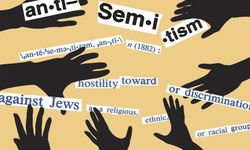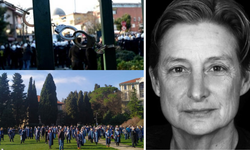As the governing alliance has drafted a 43 article draft bill, on "Prevention of the Financing of the Proliferation of Weapons of Mass Destruction" which was deilberated at the Justice Committee of the Grand National Assembly of Turkey [GNAT]; referred to the GNAT Plenary; and foreseeing amendments to 6 laws, civil society organizations in Turkey are amplifying the criticism against the draft bill. CSOs from across Turkey state that this draft bill is in violation of notably the constitution as well as the international human rights conventions to which Turkey adhere, and furthermore violating the the vested rights acquired thereof.
Civil society organizations in Turkey have initiated a
petitionThe statement reads:
In spite of the fact that it has nothing to do with its aim and title, the bill severely restricts the aid collection activities of the existing associations and foundations as well as the freedom of association through amendments introduced in the laws on Aid Collection and on Associations, and it comprises new provisions, which would establish Interior Ministry’s political tutelage over associations.
Should the bill be adopted into a law as it stands, associations and foundations working in the field of women’s rights, refugee rights, children’s rights, and LGBTI+ rights, and notably human rights associations; various associations of law, associations pursuing social advocacy as well as those using funding resources for social relief, denizens’ associations, sports clubs, associations and foundations of different faith groups, will all face the risk of being closed down pursuant to a single signature, and an “expedited closure” procedure will have been created in practice since the administrative lawsuits to be filed thereof will last for years.
As the civil society organizations with their signatures hereunder, we demand that the articles in the bill, which relate to associations, foundations and aid collection, be withdrawn due to the reasons we have comprehensively explained enclosed, and that such bills be not drawn up without receiving the views of social partners.
ASSESSMENT ON THE DRAFT BILL
General Reasoning of the bill:
The general reasoning of the bill has been indicated as “to catch up with international standards in the fight against the financing of terrorism and laundering offences in light of the 2019 report of the Financial Action Task Force-FATF and the UN Security Council (UNSC) resolutions.
However, although UNSC resolutions are binding in terms of international law, the regulation --through a law-- of the measures, which the aforementioned resolutions do not impose on signatory States as obligations, cannot be claimed to be a requirement of international law. Regulations that are not a compulsory outcome of the Security Council resolutions must be
not in violation of the constitution and international human rights conventions, just like it is the case for other laws. In fact, the Security Council resolution, which is the basis, also openly points out that the measures to be taken must not be in violation of international human rights law. It is clear that, contrary to what has been explained, the provisions in this bill are against the constitution and international human rights, let alone being pursuant to a UNSC resolution.
When the general reasoning and the articles proposed are looked into, one would see that the last two articles are on enforcement and execution, and that there are merely 6 articles that address the objective [of the bill] while the remaining 35 have got no direct relation with the basic reasoning. It is imperative that the bill must be considered in connection the other laws as well as together with the problems that the country has as regards the rule of law.
The processes of setting and implementing standards for the safeguarding of human rights and freedoms must be carried out transparently with the participation of and in consultation with those, who are impacted by the relevant laws and policies.
In Turkey, there are around 120 thousand associations. This number of associations directly or indirectly concern/are connected to at least 1.5 million adults and, together with their families, at least 10 million people. In short, this bill --on such an important topic that concerns the whole of the civil society in Turkey-- was prepared by excluding the civil society and without gathering the views of any social parties; was taken up in expedited manner at the Justice Committee on 19 December 2020; was referred to the GNAT Plenary in negligence of all proposed changes; and in this period of Covid-19 pandemic, social parties have been cast aside, and these steps which would bring about a huge restriction over the freedom of association have come up as a fait accompli.
CSO'S VIEWS ON THE AMENDMENTS
- The bill regulates that in the case of individuals who have been subjected to investigation for crimes within the scope of the Law on the Prevention of Financing of Terrorism as well as for production and trade of drugs or stimulants, or of laundering the proceeds of crime falling in the scope of in the Turkish Penal Code, Minister of Interior shall be empowered to suspend such individuals from office or to suspend the activities of the association.
Investigation is a procedure carried out by the prosecutor’s office where there is a suspicion. It is not a final judgement. Where the executives of the association are subjected to proceedings as if they are criminals in the absence of a court decision, it is in violation of the presumption of innocence and the Constitution.
The Bill also introduces new restrictive and punitive criteria to the Law on the Prevention of Financing of Terrorism no 6415. Furthermore, by means of introducing provisions which are not stipulated in the relevant International Convention on the Prevention of Financing of Terrorism (1999) and introducing provisions restricting even eliminating freedom of association, the scope of the Convention has been entirely exceeded.
The Bill that looks fine and within the scope of the UN Security Council at first glance entails the potential for extremely serious human rights violations. The scope of the bill covers actions that are considered as terror crimes within the scope of the Anti-Terror Law of 3713 in addition to the international treaties. If the provision is enacted management of an association can be seized due to a single person who has been subjected to investigation based on ATL.
Given that a majority of the executives of particularly human rights associations are being subjected to court cases based on groundless charges, given that more than 300.000 people are being investigated only for membership to organisation, given that thousands of civil society activist, journalists, politicians, members f professional organisations are investigated within the scope of ATL, there is no doubt that this law will target almost all opponent associations.
By the same token it is impossible to analyse this wide implementation area free from the issue of uncertainty and arbitrariness of terror crimes in Turkey. Definition of terror in Anti-Terror Law (ATL) no 3713 is uncertain and incompatible with international criteria. Moreover, the crime of propaganda regulated in paragraph 2 Article 7 of this law, has been amended exactly 6 times following the ECtHR rulings. There are currently hundreds of applications before ECtHR and Constitutional Court (CC) on unfair implementation of this rule. Similarly, in its recent rulings ECtHR upheld that the crimes of aiding the organisation and committing crimes in the name of the organisations albeit not being a member of the organisation, regulated in Turkish Penal Code (TPC) Article 220/6 and 7 paragraphs, was in violation of the legality criteria foreseen by the Convention. Now it will become possible to seize the management of an association due to executives who have been subjected to investigation based on these uncertain crimes, therefore it is impossible to note that this consequence it is a requisite of the UN SC decision.
Judicial review foreseen in the bill also falls short of addressing these risks. The Minister of Interior (MoI) will suspend the activities of an association on grounds that a court case was filed against a person, and the judge who reviews this decision will review this interim decision without incorporating it in the case. In other words, in practice the judge will only see if the decision of the MoI is indeed based on a judicial investigation. Hence due to an investigation that will perhaps last for years the association will not be able to operate. If this provision is enacted freedom of association of the executives of associations, which is guaranteed through elections and being elected, will be placed under political tutelage of the Ministry of Interior.
- Despite the provision in Article 13 of the Constitution that the essence of fundamental rights and freedoms cannot be infringed upon, the bill introduces a permanent deprivation of rights for association members by stipulating that those previously convicted of terrorist crimes or crimes specified in the law cannot take up executive duties in associations even after their sentences have been served. If this bill is enacted, then people who have been convicted of crimes listed in Article 3 of the ATL and particularly of offences that should be dealt with within the scope of freedom of expression and who have served their sentences will no longer become executives of associations, and these people will be stigmatized in social life.
- With the bill, in cases where acts for which it is forbidden to provide or collect funds as specified in the Law on the Prevention of Financing of Terrorism are detected, the President may decide to freeze the assets of associations or foundations that perform such act. Such decision will be implemented without delay as soon as the Presidential decree is published in the Official Gazette. The act of preventing the activities of associations in the absence of any judicial review will mean the ruling out of safeguards enshrined in the constitution and international conventions in terms of freedom of association and property rights.
- With the bill, in addition to auditors assigned by the commission formed by the Ministry of Interior, Ministry of Finance and Treasury, public officials who have been authorized to conduct audits -when deemed necessary by the Minister of Interior- will also be empowered to perform audits on associations at any time. However, no criterion has been formulated regarding the qualifications of these persons. Moreover, the scope of the audit is totally vague. What could be audited and controlled by a civil servant about an association dealing with human rights and for what purpose? What files, which content could be examined and to what extent? The audits currently carried out upon a complaint will thus be turned into continuous actions. It is known that in the current system, there are audits that sometimes continue for months.
- Without prejudice to the provisions regulated in the special law, during an investigation initiated by the Ministry of Interior or the administrative authorities about an association, if there is another association or organization with which the association under examination does business with, then information and documents may also be requested from them. Therefore, under these circumstances, another association, foundation or similar organisation that provided a grant to an association or carried out joint works may also be subject to controls. This will consequently restrict cooperation and collaboration among associations.
The aid collection procedures of natural and legal persons are regulated in the Aid Law No. 2860. Pursuant to this law, individuals/organisations that will collect aid are obliged to submit a petition to the relevant authority stating how long they will collect aid, in which province / district it will be collected and the subject for aid collection.
The launching of aid campaigns on the Internet by associations is included within the scope of the current authorisation system; as soon as it is understood that an unauthorized aid campaign is carried out on the internet, the Ministry of Interior will be authorized to reach the organization running the campaign via e-mail urging them to terminate the campaign within 24 hours, or to request a decision for blocking access through the criminal court of peace in cases where it cannot reach the campaign provider. Therefore, the scope of the ban is being expanded, making it easier to intervene in the financial support resources of associations and foundations. As such, associations and foundations whose activities completely rely on collection and provision of aid, will be fully under supervision.
Likewise, high administrative fines are foreseen for those who collect unauthorised aid and provide domain for them; in addition to administrative fines for unauthorized aid collection, it will be possible to seize the aid and governors and deputy governors are granted the power to impose sanctions related with the seized aid. Apart from the collected aid amount in case of unauthorised aid, a pecuniary fine of up 200,000 TL may be imposed which will in practice lead to the closure of many associations.






